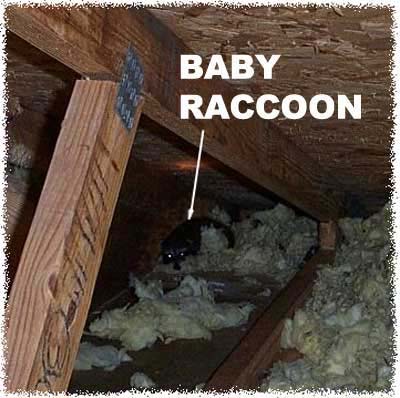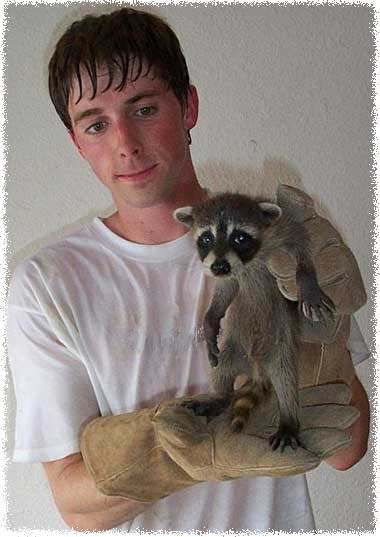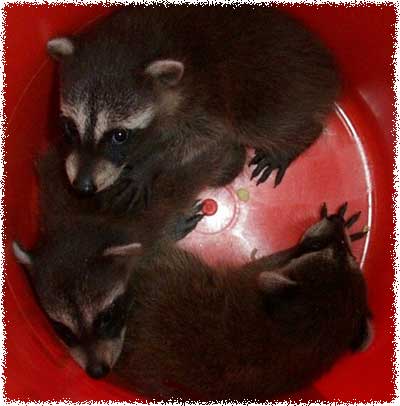| |
|
How to Get Rid of Baby Raccoon in the Attic
A litter of baby raccoons in the attic.
Baby raccoons in an attic can be quite a challenge. I've heard of many unfortunate stories
in which a lazy trapping company caught the hungry mother raccoon in a trap outside on the ground,
and left the babies inside the attic to starve to death. This is not right. A good trapping
company will search hard throughout the attic for the babies, and find and remove them all by hand.

The baby raccoons are often back in a tight corner.
Here is one of them snug in a tight spot. I need a long
pole to reach and remove the baby raccoon.

Here is one of the four babies that I remove from this
particular attic. It's almost too ugly to lay eyes upon.

This photo shows the other three baby raccoons in a
bucket. I make sure that all babies are either released with
the mother, or brought to a licensed wildlife rehabber.
|
It is difficult to get rid of baby raccoons in an attic. There is no easy fix, such as a spray or powder or sound emitting device. They must be physically removed, and
relocated. This often means crawling into the toughest areas to get the young, and facing an angry mother raccoon - work that should only be performed by a professional
who is vaccinated against rabies. If you need to get rid of a raccoon in your attic, I recommend that you call a professional wildlife expert.

For more raccoon removal information, go back to the raccoon control page.
If you don't live in Orlando FL, click here for the National Directory of Wildlife Trappers.
Raccoon in attic will it leave on its own - A raccoon in an attic will probably not leave on its own for good. It may come and go throughout the day and night, but if thatís its home, you can bet the critter will return. Not only is your raccoon looking to live in the attic, most of these animals that sneak into a human house are female. The female raccoon is probably pregnant and looking for a place to have her babies if she hasnít had them already. The worst thing you can do in this situation is to seal up the attic without trapping the raccoon. If she is a mother and her babies are somewhere inside the attic, sheís going to rip holes in your roof trying to get back in. Even if she doesnít succeed, the babies will eventually die and the resulting smell will make you wish you had just left the raccoon alone. The best way to handle the raccoon in your attic is to have a professional come to trap and remove the critters. If you canít afford to do this, youíre going to need to learn how to attach a cage trap to the opening in your roof. If you can scare the raccoon into the trap, youíll be able to scoop up the babies and have all of them relocated to a safe area.
Raccoon attic damage - Repairing an attic after a raccoon has been living inside can be a challenge. Not only do you have to clean out all the insulation and droppings, you have to make sure that any porous material is taken out and replaced. The damage a raccoon can cause isnít always done by the raccoon directly. Fecal material and urine sitting on wood can cause rot and dangerous fungal growth. In addition to the internal damage to the attic, there will be a gaping hole somewhere in the exterior of the home. A raccoon wonít make a nice, neat hole to enter and exit through. More likely than not, the hole will be torn through an eave or soffit and will be a garish opening visible from the outside. This opening needs to be repaired as soon as all the baby raccoons and adult are out of the attic. If you leave it open, not only do you run the risk of having a new raccoon enter the building, you risk having new pests like rats entering the home to investigate. While rats are smaller than a raccoon, the damage they cause can be more serious and more widespread.
A building inspection is a very important part of any wildlife removal job. Learn more about inspection to find wildlife entry holes.
| |
|